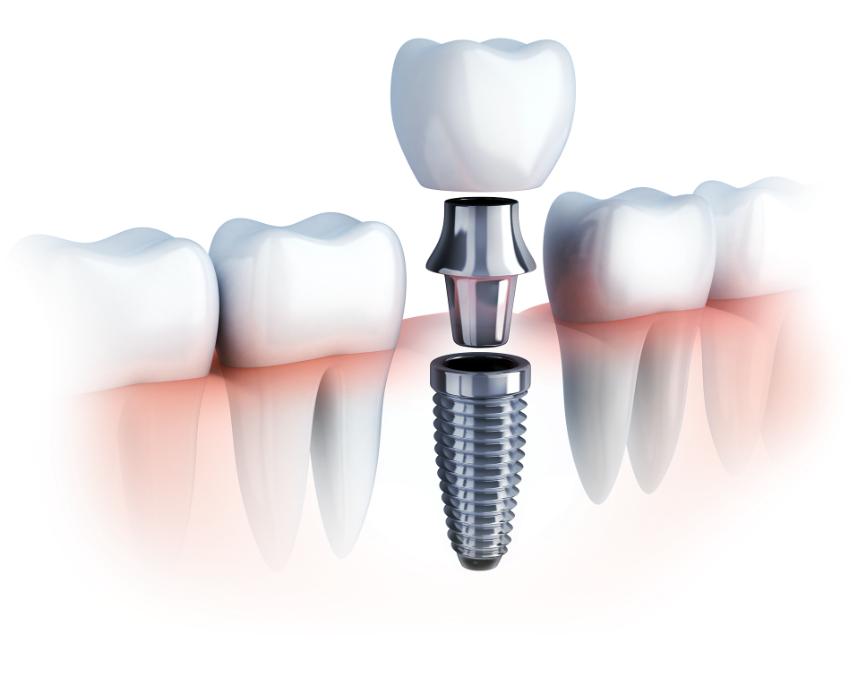Not known Details About Dental Sense
Not known Details About Dental Sense
Blog Article
Not known Details About Dental Sense
Table of ContentsLittle Known Facts About Dental Sense.Not known Facts About Dental SenseSome Known Factual Statements About Dental Sense Not known Incorrect Statements About Dental Sense
are clinical tools surgically dental implanted right into the jaw to recover a person's capacity to chew or their appearance. They provide support for synthetic (phony) teeth, such as crowns, bridges, or dentures. When a tooth is shed as a result of injury or disease, an individual can experience difficulties such as fast bone loss, malfunctioning speech, or adjustments to chewing patterns that cause pain.Dental implant systems include a dental implant body and oral implant joint and might likewise consist of a joint fixation screw. Dental implants. The dental implant body is operatively put in the jawbone instead of the tooth's origin. The dental implant abutment is typically attached to the dental implant body by the joint fixation screw and expands via gum tissues into the mouth to support the attached artificial teeth
(https://trello.com/w/dentalsense11/members)Structure of The Oral Implant System choosing oral implants, speak with your dental supplier concerning the potential benefits and threats, and whether you are a prospect for the treatment. Points to take into consideration: Your overall health and wellness is an important consider figuring out whether you are a great candidate for dental implants, exactly how long it will take to heal, and exactly how long the dental implant may stay in place.
Cigarette smoking might influence the recovery process and reduce the long-term success of the implant. The healing process for the dental implant body might take several months or longer, throughout which time you generally have a short-term abutment instead of the tooth. the oral implant treatment: Thoroughly adhere to the oral health directions provided to you by your oral provider.
Things about Dental Sense
Implant failure can lead to the demand for another procedure to fix or replace the dental implant system. Restores the ability to chew Restores cosmetic look Assists keep the jawbone from diminishing because of bone loss Preserves the wellness of the bordering bone and gum tissues Helps keep surrounding (close-by) teeth stable Boosts lifestyle Damages to surrounding all-natural teeth during dental implant placement Injury to the surrounding tissues throughout surgical procedure, such as sinus perforation Injury during surgical treatment (for example, fracture of surrounding jawbone) Poor function, such as really feeling like the teeth do not attack with each other typically A sensation that the tooth hangs or twisting in place arising from a joint screw loosening up Implant body failing (looseness of the dental implant body) due to systemic infection, which may be more probable in people with unchecked diabetes mellitus due to local infection in bone and periodontals sustaining the dental implant body because of postponed healing, which may be more probable in patients that smoke Trouble cleaning the periodontals around the implant, resulting in poor dental hygiene Unattended gum condition Post-surgical feeling numb due to nerve impingement or damages Always alert healthcare companies and imaging service technicians that you have oral implants prior to any kind of magnetic vibration imaging (MRI) Continued or x-ray treatments.
FDA is not aware of any adverse events reported for MRI or x-ray procedures with oral implants. Dental implants systems are commonly made from materials that follow international agreement criteria of the International Organization for Standardization (ISO) or ASTM International. These standards have details of what makes a safe material.

A dental implant is a structure that changes a missing out on tooth. With screw-like tools, the surgeon inserts an implant into the jawbone, and it acts as an anchor for a synthetic tooth, called a crown.
3 Easy Facts About Dental Sense Shown
Some people are not qualified for dental implant surgical treatment. It is for dental specialists to operate individuals with: acute illnessuncontrollable metabolic diseasebone or soft tissue condition or infectionIf these problems are solved, an individual can have the surgical procedure. In, oral surgeons avoid operating on individuals with: If people with any of the above go through dental implant surgical procedure, there is a higher danger of the dental implant stopping working.

Dental dental implant surgical procedure is a personalized procedure. Provide you time to heal. Affix the post and final crown, bridge or denture.
Next off, your surgeon will meticulously position the oral implant into your jaw. Your doctor will rearrange your periodontals and close the cut with stitches. If your dental implant is near the front of your mouth, your dental professional will make a temporary tooth for you to put on till you heal. That method, you will not have a void in your smile while you recuperate.
All about Dental Sense
Throughout the recovery stage, your jawbone needs to fuse to the dental implant. This process can take anywhere from three to 9 months.
Once your dental implant heals, your dental expert can attach the abutment (little adapter post) and your final remediation (crown, bridge or denture). This usually takes about one hour to complete and may need a second small surgical treatment. You shouldn't feel any pain throughout your dental implant procedure because your supplier will utilize drug to numb your gums.
Report this page